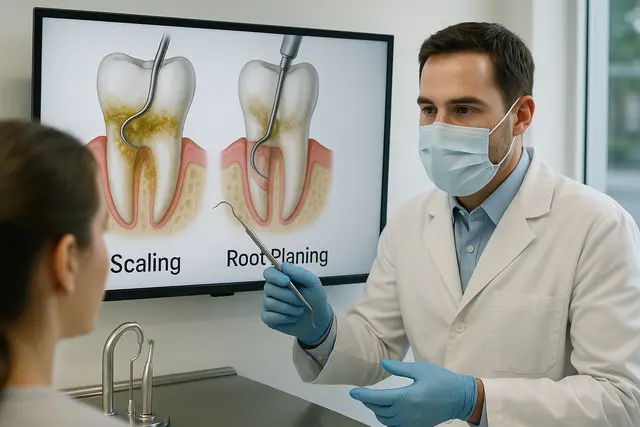General Dentistry
5 min read
May 12, 2025
Key Disadvantages of Electric Toothbrush Most People Overlook
When it comes to keeping your teeth clean, electric toothbrushes have become the go-to gadget for many. They promise better plaque removal, smarter features, and a tech-savvy twist on your daily routine. But are they really all that? Before you toss out your trusty manual brush, it’s worth exploring the key disadvantages of electric toothbrushes most people overlook.

Electric toothbrushes have changed how we brush our teeth. With just the press of a button, the head of the toothbrush vibrates or oscillates, claiming to remove more plaque and improve your overall oral hygiene. Sounds great, right? And for many people, it really is. But here’s the twist: despite the buzz around them, electric toothbrushes aren't perfect. In fact, there are a few key disadvantages of electric toothbrushes most people never think about, until they switch and go, “Wait, what?”
Let’s break down the less glamorous side of the electric brush, from cost and upkeep to the little annoyances that can quietly chip away at your brushing routine.
When Convenience Comes at a Cost
Let’s start with the obvious one: electric toothbrushes are more expensive than manual. We’re not just talking about the upfront cost of the electric model itself. We’re talking about the replacement heads every three or four months, the batteries or chargers, and sometimes, even specialized brush heads that only work with a specific brand. Many electric toothbrushes come with sleek designs and techy features, but your wallet feels every bit of that innovation.
Compared to manual brushes, which you can grab at nearly any store for a few bucks, an electric toothbrush can set you back quite a bit. And if you’re in a household where multiple people need their own heads for one base? It adds up fast.
Built-In Features Can Be a Double-Edged Sword
Many electric toothbrushes come with a built-in timer to encourage brushing for a full two minutes. Some even have pressure sensors, multiple brushing modes, and Bluetooth connectivity to track your brushing habits. While these features sound helpful, and sometimes are, they can also overcomplicate a simple task.
If you’ve ever had your electric toothbrush stop mid-brush because the battery ran out or the timer reset weirdly, you know what we mean. Not to mention that some built-in features require syncing with apps or updating firmware (yes, that’s a thing now), which most people don’t expect when they just want to clean their teeth. And when it comes to dental care, sometimes it’s worth looking beyond the brush.
Brush Heads Aren’t One-Size-Fits-All
A manual toothbrush or an electric, either way, what really matters is how it fits your mouth. But here’s the thing: some people find that electric brush heads are too big or too small for certain parts of their mouth. The head of the toothbrush may not reach all the surfaces of your teeth as well as you’d like, especially the way back molars or tight gaps.
Also, the bristle variety is sometimes limited with electric models. People with sensitive teeth or gums might find the standard brush heads too harsh, while others may struggle to find heads that clean effectively without feeling abrasive on the enamel.
They’re Not Always Travel-Friendly
Imagine you’re traveling for the weekend, and as you pack your bag, you realize your electric brush needs its charger. Or worse, it’s dead and the charger’s already buried somewhere in your luggage from the last trip. Unlike manual and electric toothbrushes that are easy to toss into a toiletry bag and forget about, electric ones come with cables, docks, and the anxiety of battery life.
Plus, some models don’t support international voltages or need adapters, just another headache if you’re heading overseas.
A False Sense of Security
Here’s a surprising drawback: many people using electric toothbrushes assume the brush is doing all the work. But brushing your teeth isn’t a passive task. Your dentist will tell you, it’s still important that you brush with intention, guiding the bristles to cover all areas, not pressing too hard, and spending equal time on all surfaces of your teeth.
Using electric may trick people into thinking they don’t need to be as mindful. But just like with a manual one, bad brushing habits don’t magically disappear because you’ve got a fancier tool. You can still miss plaque. You can still damage your gums if you’re aggressive. The brush doesn’t do it all for you.
Too Intense for Some People
Let’s talk about vibration. For people with sensitive teeth or certain sensory conditions, the buzz of an electric toothbrush might be downright unpleasant. It can tickle your nose, rattle your jaw, or leave your gums feeling sore. And if you have dental work like crowns or braces, some vibrations may feel harsher than expected.
Although electric toothbrushes offer benefits like improved plaque removal, the experience isn’t always smooth for everyone. A quiet manual brush might feel more comfortable, especially first thing in the morning or late at night when your senses are already on edge.
Not Ideal for Kids or People with Limited Dexterity, Sometimes
You might’ve heard that electric brushes are easier to use and great for people with arthritis or limited mobility. And yes, they can be. But here’s the catch: not all models are built with those needs in mind. Some are slippery to hold, heavy, or come with buttons that are awkward to press. And for kids? The vibrations can feel scary or weird, leading them to resist brushing altogether.
Ironically, a basic manual toothbrush with a chunky handle might be easier for some people to grip and control than a sleek, vibrating stick that tries to double as a phone accessory.
Sustainability and Waste
If you care about the environment, here’s another consideration. Electric toothbrushes create more waste. Brush heads, plastic components, batteries, and even the electronic base all need disposal or recycling. And let’s be honest, most people don’t know how to recycle an old electric toothbrush properly.
A simple manual brush might feel old-school, but in some cases, it leaves a smaller footprint. And there are even sustainable manual options made with bamboo or biodegradable materials, which are still rare in electric form.
So, What’s the Verdict?
The decision between electric or manual toothbrush isn’t black and white. The truth is, it depends on your personal preferences, your oral health needs, and your lifestyle. Some people love the feel and features of an electric brush, while others swear by the simplicity and control of a manual toothbrush. Either way, the goal is a healthy, radiant smile.
If you’re brushing your teeth twice a day, replacing your toothbrush every few months, and following proper brushing technique, you’re already doing better than most. Whether you use a manual toothbrush or an electric, what matters is consistency and care. And don’t forget, regular dental check-ups are just as crucial as your at-home routine.
What Are the Main Disadvantages of Using an Electric Toothbrush?
While electric toothbrushes offer great cleaning power, they come with drawbacks. They’re more expensive than manual brushes, requiring both a higher initial cost and ongoing expenses for replacement heads. They can also feel bulky, break down more easily, and may be uncomfortable for people with sensitive teeth or sensory issues. Plus, they can give users a false sense of security, making them less mindful about brushing technique.
Are Electric Toothbrushes Good for Travel?
Electric toothbrushes can be less convenient for travel. They often require charging docks or batteries, and some models aren’t compatible with international outlets. If the battery runs out and you’ve forgotten the charger, you're out of luck. Their size and weight also make them bulkier than manual brushes, which are easier to toss into a travel bag.
Can Electric Toothbrushes Be Too Harsh?
Yes, electric toothbrushes can feel too intense for some users. The vibration or oscillation can irritate sensitive gums, dental work, or even cause discomfort in the jaw. People with braces, crowns, or heightened sensitivity may find the experience less comfortable than using a gentle manual brush, especially if the bristles are too stiff.
Do Electric Toothbrushes Require Special Maintenance?
Electric toothbrushes do require more maintenance than manual ones. You need to replace brush heads every few months, keep the base clean and dry, and recharge the battery regularly. Some models also need firmware updates or app syncing, which can overcomplicate a simple routine. If neglected, these features may fail or affect performance.
Read Next
Related Posts

General Dentistry
Can a Sinus Infection Make Your Jaw Hurt? Understanding the Connection
Jaw pain can be unsettling, especially when it seems to appear out of nowhere alongside a stuffy nose or headache. Many people are surprised to learn that sinus infections can cause discomfort that feels like it’s coming from the jaw. Understanding the connection between your sinuses and jaw pain is key to getting the right treatment.
5 min read
Sep 15, 2025

General Dentistry
How to Stop Nerve Pain in Tooth: Fast Relief That Works
Tooth nerve pain can be one of the most intense and disruptive types of discomfort. It often strikes without warning and makes everyday activities like eating, drinking, or even talking feel unbearable. Understanding what causes this pain and how to manage it effectively is key to getting fast relief.
4 min read
Sep 15, 2025

General Dentistry
What Is SRP in Dentistry? A Complete Guide to Scaling and Root Planing
When it comes to dental health, most people think regular cleanings are enough to keep their smile safe. But sometimes, what’s happening below the gumline needs more attention. Scaling and root planing (SRP) is a treatment designed to address gum disease at its source, protecting both your gums and teeth from long-term damage.
5 min read
Sep 10, 2025
Don’t have time to research every dentist around you?
See why 30k+ patients trusted us